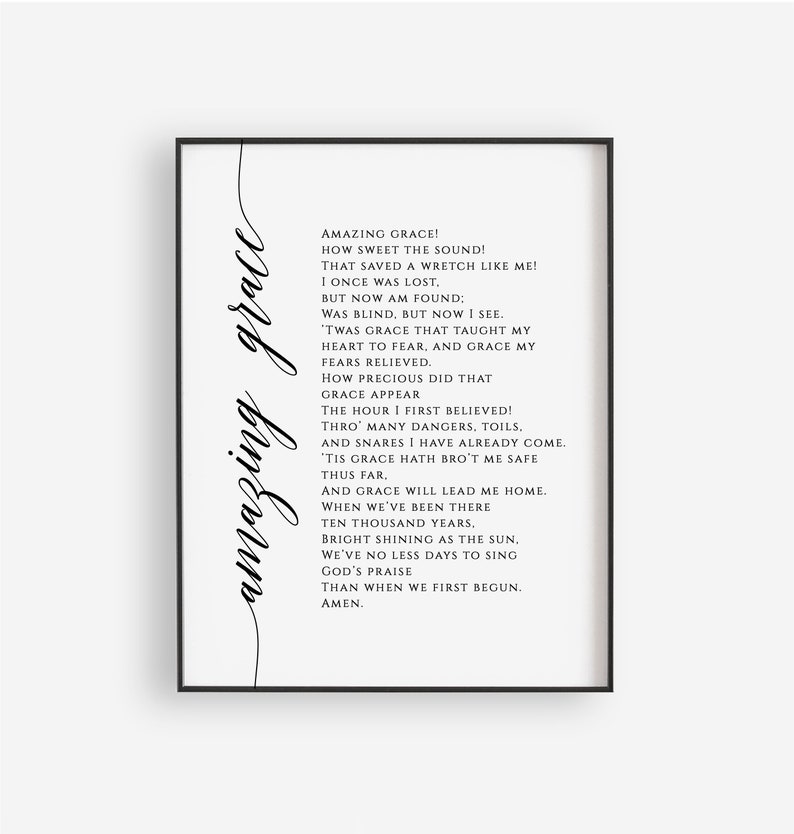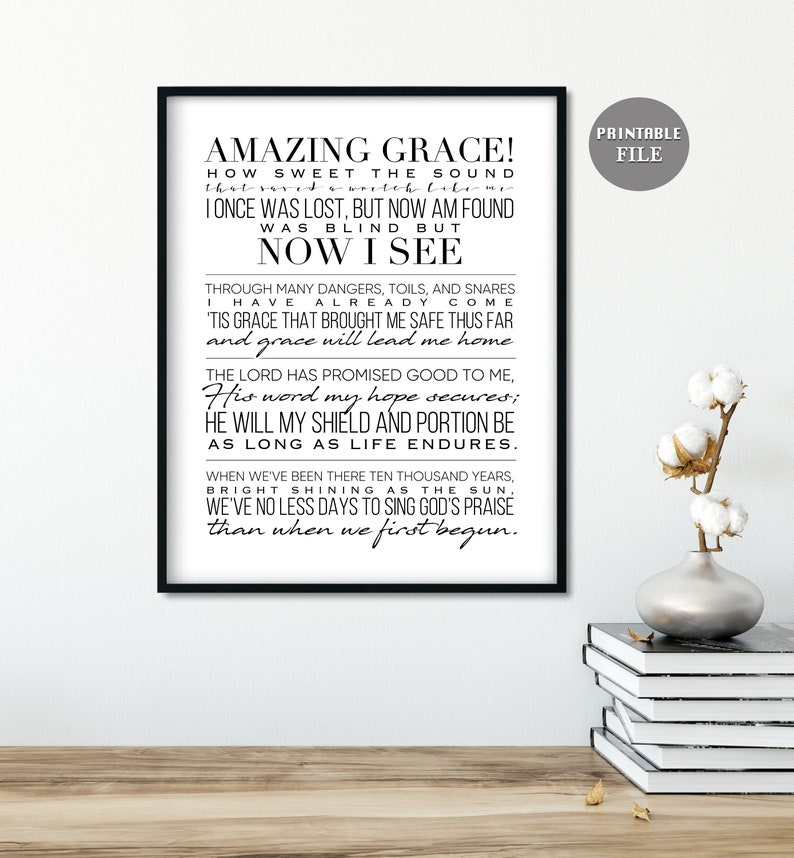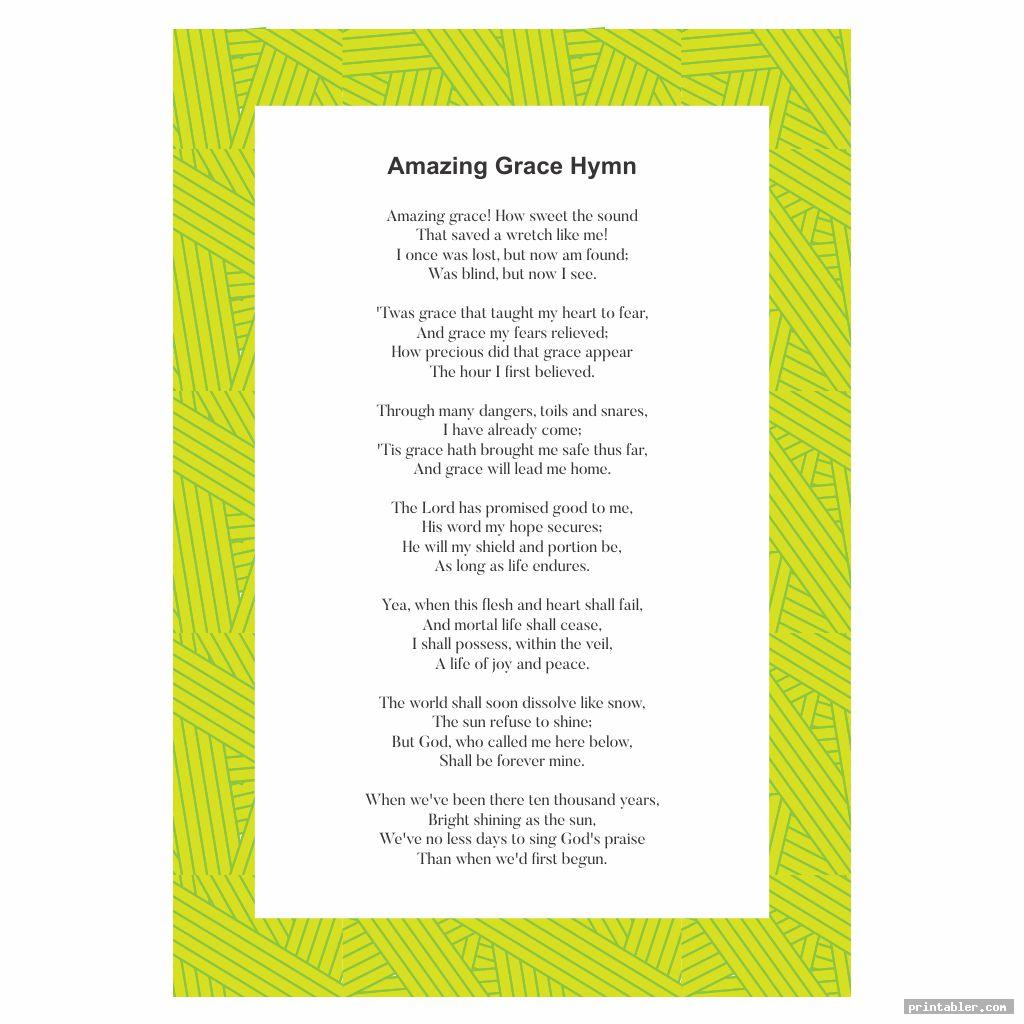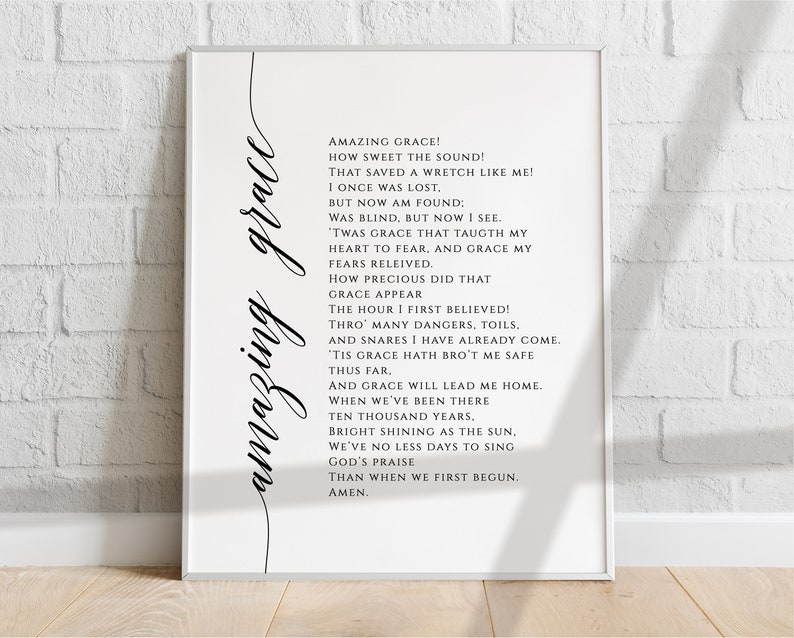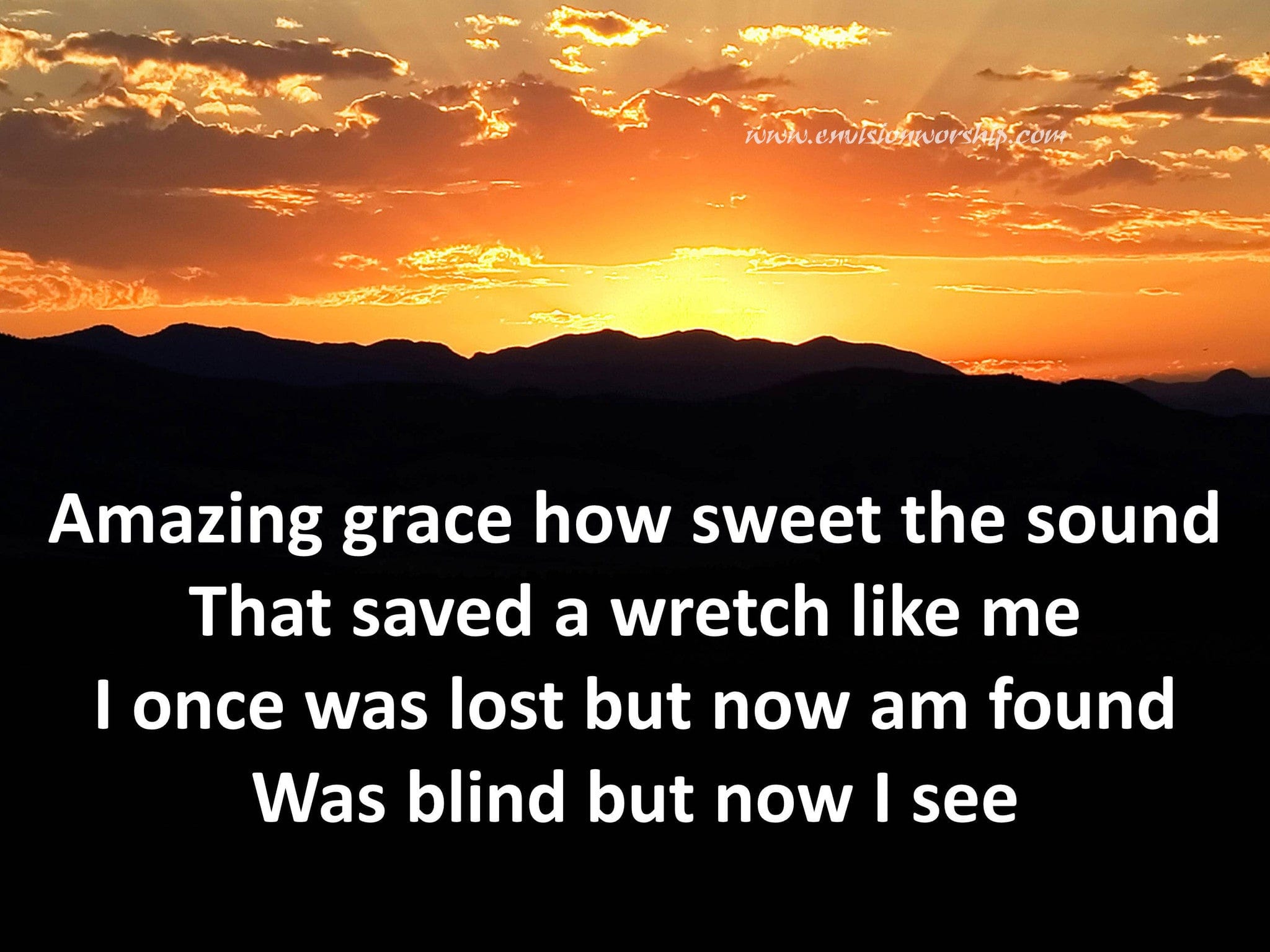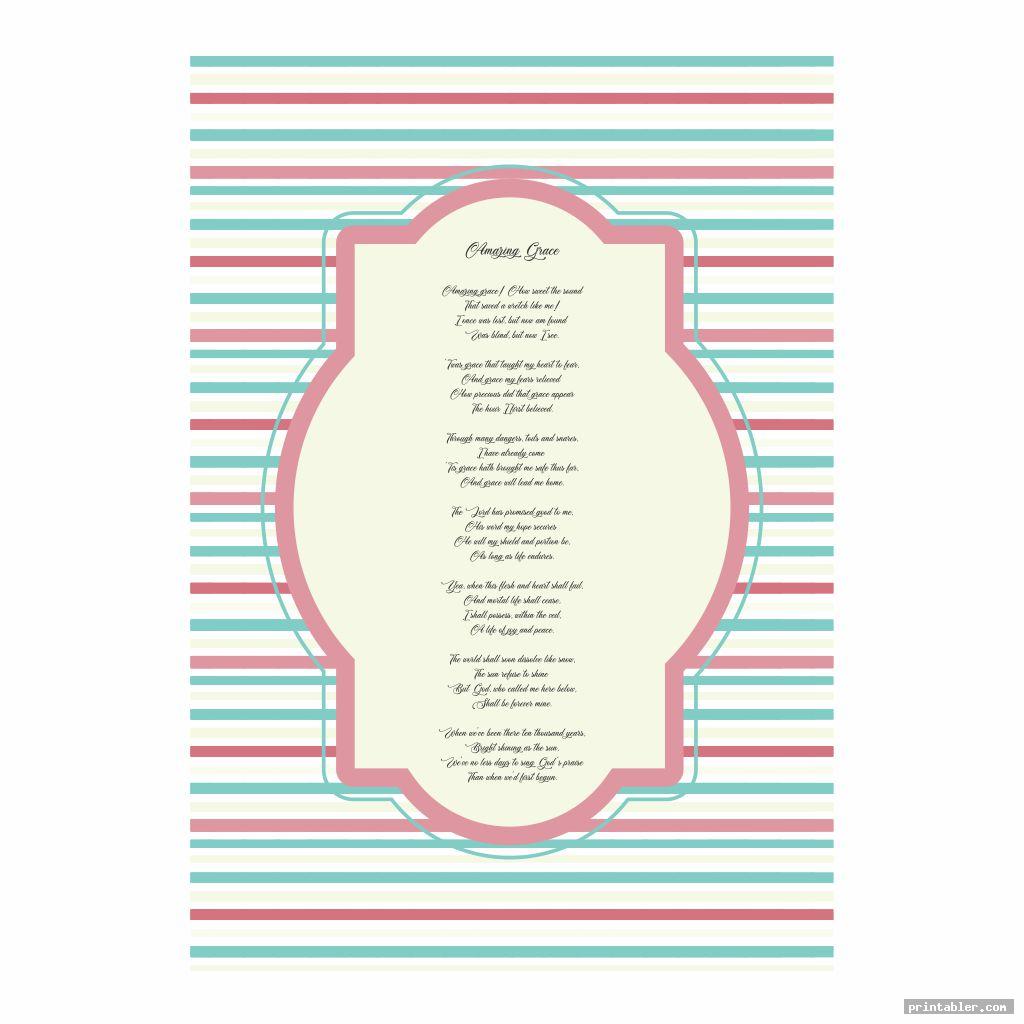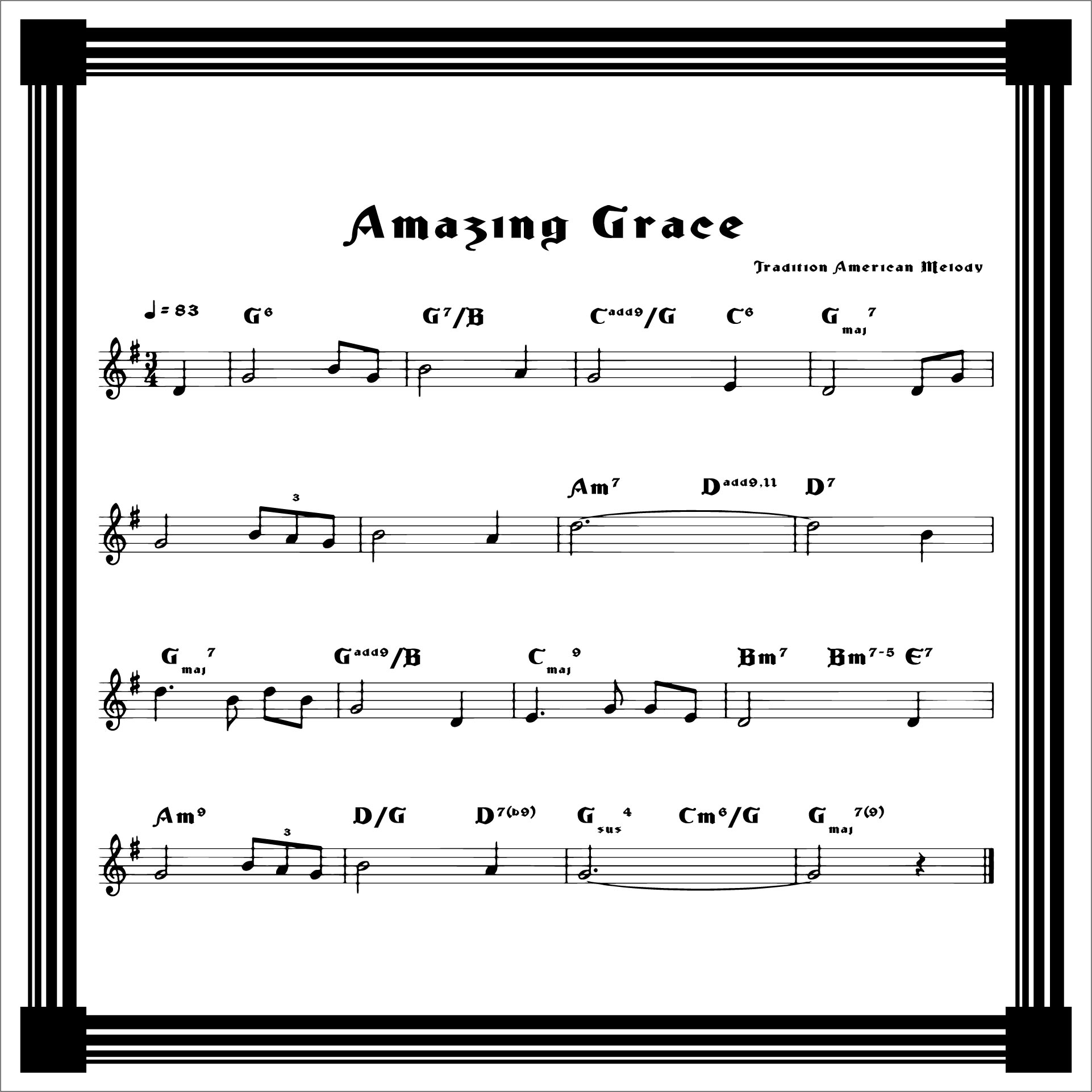Former slave ship captain and clergyman John Newton wrote the famous hymn 'Amazing Grace' in 1772, for his 1793 New Year's Day service. The hymn's emotional lyrics tell Newton's story, how he believed God saved him and showed him the errors of his ways. The hymn was then published in 1779 as part of the Olney Hymns, a group of hymns he and his poet friend, William Cowper wrote. It was set to the now very familiar tune in 1835 by American composer William Walker. When originally used in Olney, it is unknown what music, if any, accompanied the verses written by John Newton.
Contemporary hymnbooks did not contain music and were simply small books of religious poetry. The first known instance of Newton's lines joined to music was in A Companion to the Countess of Huntingdon's Hymns , where it is set to the tune "Hephzibah" by English composer John Husband. This was an amalgamation of two melodies ("Gallaher" and "St. Mary"), first published in the Columbian Harmony by Charles H. Spilman and Benjamin Shaw .
Spilman and Shaw, both students at Kentucky's Centre College, compiled their tunebook both for public worship and revivals, to satisfy "the wants of the Church in her triumphal march". Most of the tunes had been previously published, but "Gallaher" and "St. Mary" had not. As neither tune is attributed and both show elements of oral transmission, scholars can only speculate that they are possibly of British origin. A manuscript from 1828 by Lucius Chapin, a famous hymn writer of that time, contains a tune very close to "St. Mary", but that does not mean that he wrote it. Ordained in the Church of England in 1764, Newton became curate of Olney, Buckinghamshire, where he began to write hymns with poet William Cowper.
"Amazing Grace" was written to illustrate a sermon on New Year's Day of 1773. It is unknown if there was any music accompanying the verses; it may have been chanted by the congregation. It debuted in print in 1779 in Newton and Cowper's Olney Hymns but settled into relative obscurity in England.
In the United States, "Amazing Grace" became a popular song used by Baptist and Methodist preachers as part of their evangelizing, especially in the South, during the Second Great Awakening of the early 19th century. In 1835, American composer William Walker set it to the tune known as "New Britain" in a shape note format. Her version and the ROYAL SCOTS DRAGOON GUARDS version are number one with me. On a side note, while the author of the lyrics is known, the composer of the tune is UNKNOWN. And if the tune is credited to him in a hymn book, it is wrong. See media help.With the advent of recorded music and radio, "Amazing Grace" began to cross over from primarily a gospel standard to secular audiences.
The ability to record combined with the marketing of records to specific audiences allowed "Amazing Grace" to take on thousands of different forms in the 20th century. Where Edwin Othello Excell sought to make the singing of "Amazing Grace" uniform throughout thousands of churches, records allowed artists to improvise with the words and music specific to each audience. AllMusic lists over 1,000 recordings – including re-releases and compilations – as of 2019. Its first recording is an a cappella version from 1922 by the Sacred Harp Choir. It was included from 1926 to 1930 in Okeh Records' catalogue, which typically concentrated strongly on blues and jazz. Demand was high for black gospel recordings of the song by H.
A poignant sense of nostalgia accompanied the recordings of several gospel and blues singers in the 1940s and 1950s who used the song to remember their grandparents, traditions, and family roots. It was recorded with musical accompaniment for the first time in 1930 by Fiddlin' John Carson, although to another folk hymn named "At the Cross", not to "New Britain". Two musical arrangers named Dwight Moody and Ira Sankey heralded another religious revival in the cities of the US and Europe, giving the song international exposure. Moody's preaching and Sankey's musical gifts were significant; their arrangements were the forerunners of gospel music, and churches all over the US were eager to acquire them. Publisher Edwin Othello Excell gave the version of "Amazing Grace" set to "New Britain" immense popularity by publishing it in a series of hymnals that were used in urban churches.
Excell altered some of Walker's music, making it more contemporary and European, giving "New Britain" some distance from its rural folk-music origins. Excell's version was more palatable for a growing urban middle class and arranged for larger church choirs. Several editions featuring Newton's first three stanzas and the verse previously included by Harriet Beecher Stowe in Uncle Tom's Cabin were published by Excell between 1900 and 1910. His version of "Amazing Grace" became the standard form of the song in American churches. The story of 'Amazing Grace' is found in the Bible, heard in the hymn and demonstrated in the lives of countless followers of Christ. The hymn, first titled 'Faith's Review and Expectation' was written by John Newton whose story is as amazing as the Grace that was his salvation.
He began life as the priviliged son of a sea captain, became a slave and a slave ship captain before becoming a servant of Christ. Although "Amazing Grace" set to "New Britain" was popular, other versions existed regionally. In the late 19th century, Newton's verses were sung to a tune named "Arlington" as frequently as to "New Britain" for a time. The New Testament served as the basis for many of the lyrics of "Amazing Grace". The first verse, for example, can be traced to the story of the Prodigal Son. In the Gospel of Luke the father says, "For this son of mine was dead and is alive again; he was lost, and is found".
The story of Jesus healing a blind man who tells the Pharisees that he can now see is told in the Gospel of John. Newton used the words "I was blind but now I see" and declared "Oh to grace how great a debtor!" in his letters and diary entries as early as 1752. The effect of the lyrical arrangement, according to Bruce Hindmarsh, allows an instant release of energy in the exclamation "Amazing grace!", to be followed by a qualifying reply in "how sweet the sound". In An Annotated Anthology of Hymns, Newton's use of an exclamation at the beginning of his verse is called "crude but effective" in an overall composition that "suggest a forceful, if simple, statement of faith". Grace is recalled three times in the following verse, culminating in Newton's most personal story of his conversion, underscoring the use of his personal testimony with his parishioners.
The lyrics of the song were written in 1772 by English poet John Newton and it was published for the first time as a poem in Olney Hymns, by J. They talk about the author's conversion to Christianity, after he was previously a slave trader and became a staunch activist against slavery. Enjoy the lovely words and lyrics of Amazing Grace, the traditional, classic hymn and Christian song. This Printable version of Amazing Grace is a hymn of praise and worship which is suitable for all Christian denominations. These online, free lyrics to the Christian Hymn and song Amazing Grace can be printed and used to create a personalised hymn book. Yea, when this flesh and heart shall fail, And mortal life shall cease, I shall possess within the veil, A life of joy and peace.
Christian lyrics online will lead you to thousands of lyrics to hymns, choruses, worship songs and gospel recordings. Free Christian hymn lyrics include popular hymns, both new and old, traditional and modern, as well as rare and hard-to-find hymns. We have been online since 2004 and have reached over 1 million people in over 150 countries worldwide. In 2007, this site became the largest Christian lyrics site on the entire internet.
"Amazing Grace" is a powerful hymn of profession of God's grace and mercy, and can be sung throughout the liturgical year. It could be sung as a hymn of response to the assurance of pardon, as a confession of faith, or after a sermon on salvation or grace. It's also often sung as a hymn of comfort in times of distress, and so could work well as a response to lament, or as a hymn of assurance at funerals.
One of, if not the most popular hymn in the United States, this hymn has been performed by countless artists and arranged to many different styles. Because of its simple folk melody, it can be sung as a round, and it also works well to sing at least one verse a cappella. Many occasions of worship when we need to confess with joy that we re saved by God's grace alone; as a hymn of response to forgiveness of sin or as an assurance of pardon; as a confession of faith or after the sermon.
When he left the navy atheist Newton became involved with the slave trade as a ship captain. Although he remained a captain until , his conversion to the Christian faith began in 1748 when a violent storm battered his ship, causing him to ask God for mercy. As a result he started questioning his role in the slave trade, and studying Christianity. He later became an abolitionist, as well as a clergyman, working alongside William Wilberforce to abolish the slave trade, which finally happened in 1807 just before his death.
Although it had its roots in England, "Amazing Grace" became an integral part of the Christian tapestry in the United States. More than 60 of Newton and Cowper's hymns were republished in other British hymnals and magazines, but "Amazing Grace" was not, appearing only once in a 1780 hymnal sponsored by the Countess of Huntingdon. Scholar John Julian commented in his 1892 A Dictionary of Hymnology that outside of the United States, the song was unknown and it was "far from being a good example of Newton's finest work". Newton's conversion was not immediate, but he contacted Polly's family and announced his intention to marry her. Her parents were hesitant as he was known to be unreliable and impetuous. They knew he was profane too but allowed him to write to Polly, and he set to begin to submit to authority for her sake.
After a severe illness his resolve was renewed, yet he retained the same attitude towards slavery as was held by his contemporaries. Newton continued in the slave trade through several voyages where he sailed the coasts of Africa, now as a captain, and procured slaves being offered for sale in larger ports, transporting them to North America. In 1835, South Carolinian William Walker combined lyrics written in the 1770s by John Newton with a popular tune called "New Britain." The result was the most popular American hymn of the Civil War era and of all-time. Turner tells NPR's Liane Hansen it was written without "ceremony" in an attic room where Newton wrote weekly hymns to amplify the message of his sermons.
When Newton put the internal rhyme "amazing grace" together, it wasn't purely for poetic reasons. He understood grace to mean God's unmerited favor to lost souls. Turner says it was a meaning Newton — with his sordid history and personal tale of redemption — could take to heart. 'Amazing Grace' "Amazing Grace" has become a pop, folk and gospel standard since Englishman John Newton, a slave trader-turned-abolitionist, wrote the words in the 1700s.
NPR's Liane Hansen talks with Steve Turner about his new book and the song's remarkable history. In seeking an answer to his question John Newton was led back to the Bible. On March 21st, lashed to the helm of a foundering ship, he considered many verses which he began to see in the Light of Truth.
He was especially struck by the story of the prodigal son in Luke, chapter 15. He marveled at the father who raced to meet his wayward son and he felt hope for his own soul. When the badly damaged ship finally dropped anchor, a transformed John Newton went safely ashore. Two years later, with his fathers blessing, he married his childhood sweetheart, Mary Catlett.
Newton often openly mocked the captain by creating obscene poems and songs about him, which became so popular that the crew began to join in. His disagreements with several colleagues resulted in his being starved almost to death, imprisoned while at sea, and chained like the slaves they carried. He was himself enslaved by the Sherbro and forced to work on a plantation in Sierra Leone near the Sherbro River. After several months he came to think of Sierra Leone as his home, but his father intervened after Newton sent him a letter describing his circumstances, and crew from another ship happened to find him.
Newton claimed the only reason he left Sierra Leone was because of Polly. Author Gilbert Chase writes that it is "without a doubt the most famous of all the folk hymns". Jonathan Aitken, a Newton biographer, estimates that the song is performed about 10 million times annually. After leaving the service, he became involved in the Atlantic slave trade. In 1748, a violent storm battered his vessel off the coast of County Donegal, Ireland, so severely that he called out to God for mercy.
This moment marked his spiritual conversion but he continued slave trading until 1754 or 1755, when he ended his seafaring altogether. He began studying Christian theology and later became an abolitionist. Some theories say the tune is an adaptation after Loving Lambs, an old American folk song, while other claim that it is related to Scottish folk song Loch Lomond. However the song uses the tune of an old traditional song New Britain and it was first recorded as Amazing Grace in the 1847's edition of William Walker's tune book called "Southern Harmony, and Musical Companion".
The power of "Amazing Grace" is that its lyrics are all about God's amazing grace. There is simply nothing more important or powerful than that. The lyrics do a really good job of conveying that message, especially if you look at the story and Scripture behind them. The poem in its entirety was written at a time when poems were becoming increasingly popular as a means of making theological concepts plain for common people to understand.
His collection of hymns titled Olney Hymns, co-written with William Cowper, had an immediate impact and had widespread popularity amongst English evangelists of the time. John's father was a well respected man and captain who sought and secured several positions of opportunity for his son. But John, who was becoming increasingly rebellious, methodically squandered them all. Through his fathers influence he began several voyages in positions of authority only to be demoted to common seaman. He strayed so far from his mothers spiritual teaching that he began influencing others away from deeply held beliefs. His life had so degenerated that he was often disliked and distrusted by officers and crew alike.
He ran from his fathers support, ignored his superior officers authority and fell so far from his mothers dreams that he became known among sailors as "The Great Blasphemer." Working as a customs agent in Liverpool starting in 1756, Newton began to teach himself Latin, Greek, and theology. He and Polly immersed themselves in the church community, and Newton's passion was so impressive that his friends suggested he become a priest in the Church of England. He was turned down by John Gilbert, Archbishop of York, in 1758, ostensibly for having no university degree, although the more likely reasons were his leanings toward evangelism and tendency to socialise with Methodists. Newton continued his devotions, and after being encouraged by a friend, he wrote about his experiences in the slave trade and his conversion. William Legge, 2nd Earl of Dartmouth, impressed with his story, sponsored Newton for ordination by John Green, Bishop of Lincoln, and offered him the curacy of Olney, Buckinghamshire, in 1764.
It has had particular influence in folk music, and has become an emblematic black spiritual. Its universal message has been a significant factor in its crossover into secular music. "Amazing Grace" became newly popular during a revival of folk music in the US during the 1960s, and it has been recorded thousands of times during and since the 20th century. After being freed from slavery, he became captain of a slave ship himself. It's the most famous hymn of all time, and surely one of the most famous songs of any type.
Even if you have never been to church, you have almost certainly heard it at some point. The song reached the pop charts in the United Kingdom and the United States when Judy Collins released her version in 1971. It was another time of turbulence as U.S. military forces were mired in an unpopular war in Vietnam.
In her forward to Turner's book, Judy Collins says the song has the "power to transform" and to heal. 250 years after Newton published his poem it is widely acknowledged as one of the most recognisable songs in the English-speaking world, and the most famous of all Christian folk hymns. In 2006, Chris Tomlin released a contemporary version of "Amazing Grace," the theme song for the 2007 film Amazing Grace.
The historical drama celebrates the life of William Wilberforce, a zealous believer in God and human rights activist who battled through discouragement and illness for two decades to end the slave trade in England. He spent his teen years at sea until he was forced to join the Royal Navy in 1744. As a young rebel, he eventually deserted the Royal Navy and was discharged to a slave trading ship.








